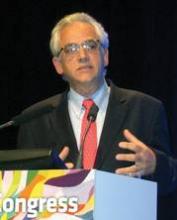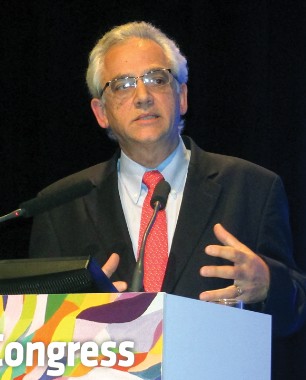User login
BARCELONA – Armodafinil, a drug with Food and Drug Administration approval to treat excessive sleepiness and narcolepsy, showed efficacy for improving concentration, energy, and appetite in a controlled study of nearly 400 patients with bipolar I depression.
"I think [armodafinil] is clinically useful because its efficacy appears complementary to the efficacy we see from other compounds," Dr. Joseph R. Calabrese said at the annual congress of the European College of Neuropsychopharmacology.
In addition to showing useful efficacy compared with placebo as adjunctive treatment, armodafinil also had a "very, very benign" adverse effect profile – its 6% dropout rate because of adverse effects was not statistically significant from the 4% rate in placebo patients.
Armodafinil is the R-enantiomer of modafinil, which means the two agents are essentially the same. "I think off-label use [of armodafinil] is okay, because there are a lot of [safety] data for modafinil," Dr. Calabrese said in an interview.
Armodafinil (Nuvigil) has FDA approval for treating shift-work disorder, narcolepsy, and treated obstructed sleep apnea. He foresees no push for formal labeling of armodafinil for bipolar I depression because three phase III trials were run and only one was positive for efficacy. The two trials that failed to prove efficacy fell short not because of a blunted drug effect but because of an unexpectedly high response in the placebo group. This design flaw in two of the three pivotal trials likely doomed any hope of getting armodafinil labeled for this indication, he said.
"There is a role for armodafinil. It is something to try for patients" who need help in the things it affects, said Dr. Calabrese, professor of psychiatry and head of the mood disorders program at Case Western Reserve University in Cleveland. "It has stimulant-like properties that can improve concentration" and can help patients who are on another drug causing sedation, he added.
The study he ran enrolled patients who had cycled into a new major depressive episode after treatment with antimanic drugs for at least 4 weeks. Most patients were on antimanic monotherapy during the study, about 10% were on two antimanic drugs, and two patients were on three drugs. The researchers randomized 198 patients to receive 150 mg of armodafinil daily and 199 to placebo. An additional 32 patients initially received 200 mg armodafinil daily, but that arm was discontinued because of adverse effects.
After 8 weeks, the study’s primary endpoint – change in average, total clinician-rated, 30-item Inventory of Depressive Symptomatology (IDS) score – showed a 21.7 point drop with armodafinil and a 17.9 point drop with placebo, a statistically significant difference. The incidence of responder patients, those with at least a 50% reduction from their baseline IDS score, was 46% in the armodafinil arm and 34% in the placebo arm, a statistically significant difference and indicating a number needed to treat of nine to achieve one additional response over placebo.
The results also showed that the improvements in IDS score focused on five of the score’s 30 individual items: panic and phobic symptoms, appetite, concentration and decision making, energy and fatigability, and leaden paralysis and physical energy. In contrast, armodafinil had no apparent effect on core symptoms of depression. Armodafinil also produced no worsening of anxiety, sleep, or switch rates, and no meaningful trends toward gain or loss of weight.
The study was sponsored by Teva, which markets armodafinil (Nuvigil). Dr. Calabrese said that he has been a consultant to and received research support from Teva and more than a dozen other drug companies.
On Twitter @mitchelzoler
BARCELONA – Armodafinil, a drug with Food and Drug Administration approval to treat excessive sleepiness and narcolepsy, showed efficacy for improving concentration, energy, and appetite in a controlled study of nearly 400 patients with bipolar I depression.
"I think [armodafinil] is clinically useful because its efficacy appears complementary to the efficacy we see from other compounds," Dr. Joseph R. Calabrese said at the annual congress of the European College of Neuropsychopharmacology.
In addition to showing useful efficacy compared with placebo as adjunctive treatment, armodafinil also had a "very, very benign" adverse effect profile – its 6% dropout rate because of adverse effects was not statistically significant from the 4% rate in placebo patients.
Armodafinil is the R-enantiomer of modafinil, which means the two agents are essentially the same. "I think off-label use [of armodafinil] is okay, because there are a lot of [safety] data for modafinil," Dr. Calabrese said in an interview.
Armodafinil (Nuvigil) has FDA approval for treating shift-work disorder, narcolepsy, and treated obstructed sleep apnea. He foresees no push for formal labeling of armodafinil for bipolar I depression because three phase III trials were run and only one was positive for efficacy. The two trials that failed to prove efficacy fell short not because of a blunted drug effect but because of an unexpectedly high response in the placebo group. This design flaw in two of the three pivotal trials likely doomed any hope of getting armodafinil labeled for this indication, he said.
"There is a role for armodafinil. It is something to try for patients" who need help in the things it affects, said Dr. Calabrese, professor of psychiatry and head of the mood disorders program at Case Western Reserve University in Cleveland. "It has stimulant-like properties that can improve concentration" and can help patients who are on another drug causing sedation, he added.
The study he ran enrolled patients who had cycled into a new major depressive episode after treatment with antimanic drugs for at least 4 weeks. Most patients were on antimanic monotherapy during the study, about 10% were on two antimanic drugs, and two patients were on three drugs. The researchers randomized 198 patients to receive 150 mg of armodafinil daily and 199 to placebo. An additional 32 patients initially received 200 mg armodafinil daily, but that arm was discontinued because of adverse effects.
After 8 weeks, the study’s primary endpoint – change in average, total clinician-rated, 30-item Inventory of Depressive Symptomatology (IDS) score – showed a 21.7 point drop with armodafinil and a 17.9 point drop with placebo, a statistically significant difference. The incidence of responder patients, those with at least a 50% reduction from their baseline IDS score, was 46% in the armodafinil arm and 34% in the placebo arm, a statistically significant difference and indicating a number needed to treat of nine to achieve one additional response over placebo.
The results also showed that the improvements in IDS score focused on five of the score’s 30 individual items: panic and phobic symptoms, appetite, concentration and decision making, energy and fatigability, and leaden paralysis and physical energy. In contrast, armodafinil had no apparent effect on core symptoms of depression. Armodafinil also produced no worsening of anxiety, sleep, or switch rates, and no meaningful trends toward gain or loss of weight.
The study was sponsored by Teva, which markets armodafinil (Nuvigil). Dr. Calabrese said that he has been a consultant to and received research support from Teva and more than a dozen other drug companies.
On Twitter @mitchelzoler
BARCELONA – Armodafinil, a drug with Food and Drug Administration approval to treat excessive sleepiness and narcolepsy, showed efficacy for improving concentration, energy, and appetite in a controlled study of nearly 400 patients with bipolar I depression.
"I think [armodafinil] is clinically useful because its efficacy appears complementary to the efficacy we see from other compounds," Dr. Joseph R. Calabrese said at the annual congress of the European College of Neuropsychopharmacology.
In addition to showing useful efficacy compared with placebo as adjunctive treatment, armodafinil also had a "very, very benign" adverse effect profile – its 6% dropout rate because of adverse effects was not statistically significant from the 4% rate in placebo patients.
Armodafinil is the R-enantiomer of modafinil, which means the two agents are essentially the same. "I think off-label use [of armodafinil] is okay, because there are a lot of [safety] data for modafinil," Dr. Calabrese said in an interview.
Armodafinil (Nuvigil) has FDA approval for treating shift-work disorder, narcolepsy, and treated obstructed sleep apnea. He foresees no push for formal labeling of armodafinil for bipolar I depression because three phase III trials were run and only one was positive for efficacy. The two trials that failed to prove efficacy fell short not because of a blunted drug effect but because of an unexpectedly high response in the placebo group. This design flaw in two of the three pivotal trials likely doomed any hope of getting armodafinil labeled for this indication, he said.
"There is a role for armodafinil. It is something to try for patients" who need help in the things it affects, said Dr. Calabrese, professor of psychiatry and head of the mood disorders program at Case Western Reserve University in Cleveland. "It has stimulant-like properties that can improve concentration" and can help patients who are on another drug causing sedation, he added.
The study he ran enrolled patients who had cycled into a new major depressive episode after treatment with antimanic drugs for at least 4 weeks. Most patients were on antimanic monotherapy during the study, about 10% were on two antimanic drugs, and two patients were on three drugs. The researchers randomized 198 patients to receive 150 mg of armodafinil daily and 199 to placebo. An additional 32 patients initially received 200 mg armodafinil daily, but that arm was discontinued because of adverse effects.
After 8 weeks, the study’s primary endpoint – change in average, total clinician-rated, 30-item Inventory of Depressive Symptomatology (IDS) score – showed a 21.7 point drop with armodafinil and a 17.9 point drop with placebo, a statistically significant difference. The incidence of responder patients, those with at least a 50% reduction from their baseline IDS score, was 46% in the armodafinil arm and 34% in the placebo arm, a statistically significant difference and indicating a number needed to treat of nine to achieve one additional response over placebo.
The results also showed that the improvements in IDS score focused on five of the score’s 30 individual items: panic and phobic symptoms, appetite, concentration and decision making, energy and fatigability, and leaden paralysis and physical energy. In contrast, armodafinil had no apparent effect on core symptoms of depression. Armodafinil also produced no worsening of anxiety, sleep, or switch rates, and no meaningful trends toward gain or loss of weight.
The study was sponsored by Teva, which markets armodafinil (Nuvigil). Dr. Calabrese said that he has been a consultant to and received research support from Teva and more than a dozen other drug companies.
On Twitter @mitchelzoler
AT THE ECNP CONGRESS
Major finding: Adjunctive treatment of bipolar I depression with armodafinil produced a 46% depression response rate, compared with a 34% rate from placebo.
Data source: Randomized, placebo-controlled, multicenter study involving 397 patients with bipolar I depression treated for 8 weeks.
Disclosures: The study was sponsored by Teva, which markets armodafinil (Nuvigil). Dr. Calabrese said that he has been a consultant to and received research support from Teva and more than a dozen other drug companies.

